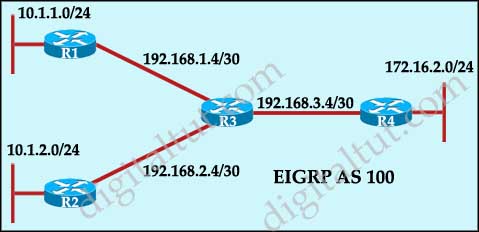EIGRP Questions 8
Here you will find answers to EIGRP questions – Part 8
Question 1
Which of the below mentioned conditions form a neighbor relation in EIGRP?(Choose three)
A. Hello or ACK received
B. AS number match
C. Hello timer match
D. Identical metric (k values)
E. Dead Timer Match
F. Network Time Match
Answer: A B D
Explanation
To become a neighbor, the following conditions must be met:
+ The router must hear a Hello packet from a neighbor.
+ The EIGRP autonomous system (AS) must be the same.
+ K-values must be the same.
Question 2
Which command should you issue first to configure EIGRP for IP?
A. ip eigrp routing
B. router eigrp process-id
C. ip eigrp autonomous-system-number
D. router eigrp autonomous-system-number
Answer: D
Question 3
Based on the topology shown in the network diagram, what optional EIGRP configurations will be required in order to achieve full connectivity within AS 100?

A. Use the EIGRP no auto-summary command on R1 and R2.
B. Use the EIGRP no auto-summary command on R3 and R4.
C. Use the passive interface on the R1 and R2 interface that connects to the 10.1.1.0/24 and 10.1.2.0/24 subnet respectively.
D. Use the passive interface command between the R3 and R1 connection and between the R3 and R2 connection.
E. Use the variance command on R3.
Answer: A
Explanation
When routing updates are sent to another major network (in this case 192.168.1.0/24 & 192.168.2.0/24), EIGRP will summarize the advertised networks automatically by default -> we have to use the EIGRP no auto-summary command on R1 and R2.
Question 4
A network administrator is managing a hub-and-spoke network with EIGRP routing that has been enabled. The hub router is trying to query a remote router. However, delays are occurring that are caused by certain paths being stuck in active (SIA). How should the administrator configure EIGRP in order to limit the scope of the query range and prevent SIA from occurring?
A. Configure the hub router with a scope limit of 1.
B. Configure the remote router with a scope limit of 1.
C. Configure the hub to indicate that the remote router is a stub router,
D. Configure the hub and remote router as stub routers.
E. Configure the remote router as a stub router.
F. Disable the SIA feature of EIGRP on the remote router.
Answer: E
Question 5
What are two possible causes for EIGRP Stuck-ln-Active routers? (Choose two)
A. Some query or reply packets are lost between the routers.
B. The neighboring router starts receiving route updates from this router.
C. A failure causes traffic on a link between two neighboring routers to flow in only one direction (unidirectional link).
D. The neighboring router stops receiving ACK packets from this router.
Answer: A C
Question 6
When configuring EIGRP to run across a 56 Kbps serial PPP link, what command do you need to put under the serial interface ensure proper convergence of EIGRP routes?
A. bandwidth 56
B. bandwidth 56000
C. ip bandwidth-percent eigrp 1 56
D. ip bandwidth-percent eigrp 1 56000
Answer: A
Question 7
The following command was issued on RouterA. Given the above output, which statement is true?
| RouterA# show ip route |
A. 192.168.1.0 is a static route.
B. 192.168.1.0 is a summarized route.
C. 192.168.1.0 is a redistributed route into EIGRP.
D. 192.168.1.0 is equal path load balancing with 172.16.1.0.
Answer: C
Question 8
If the primary path goes down, what will EIGRP use to reach a destination?
A. administrative distance
B. advertised successor
C. successor
D. feasible successor
Answer: D
Question 9
A stub area is typically created using what kind of topology?
A. Broadcast
B. Point-to-point
C. Hub and spoke
D. Full Mesh
Answer: C
Question 10
In EIGRP, when the IP default-network command is configured on a router, what is generated in the router’s configuration?
A. A static route
B. A directly connected route
C. An EIGRP route
D. A default route
Answer: D


